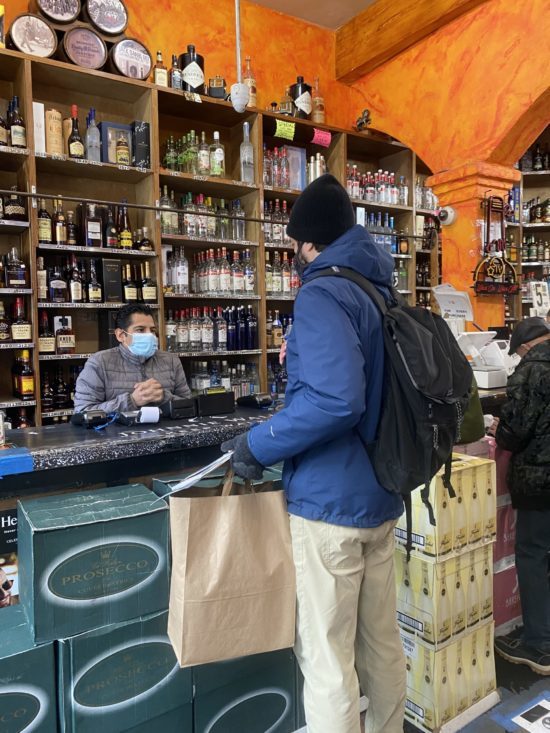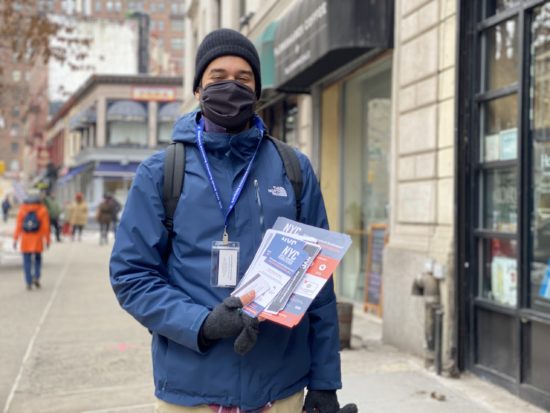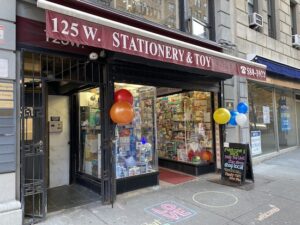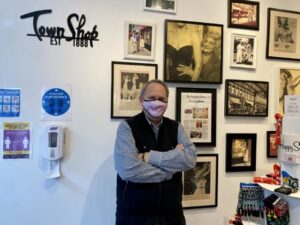When Alejandro Martinez quietly steps in the door of small businesses on the Upper West Side, proprietors have no idea there is a potential life saver in their midst. Need financial assistance? Marketing support? Some technical expertise? He has answers for each of them and more.
The lanky, winter-parka’ed, multi-lingual – and masked – recent alum of NYU’s Wagner School graduate program in public service is a neighborhood support specialist with the Manhattan Chamber of Commerce, part of a newly formed 6-member team that makes up the Manhattan arm of the NYC Small Business Resource Network (SBRN). The network was launched late last September in response to the crisis facing many of the city’s over 230,000 small businesses (defined as fewer than 100 employees). According to a press release, the program is a “one-stop shop to accelerate the recovery of small businesses and strengthen the city’s economy.”

The UWS is one of Alejandro’s three assigned territories. On one of his recent rounds in the neighborhood, Alejandro shared his approach, his setbacks, and his hopes for the future.
This morning, for a swing up and down almost a mile of upper Broadway, Alejandro carries his a run-of-the-mill tote with a few relationship building tools: dozens of oversized, well designed postcards highlighting program features along with contact information; several boxes of surgical masks for those stores that don’t have any; forms to capture basic information about the business; and extra business cards for follow up. He warmly offers these goods – a welcome package of sorts – to coax the businesses toward assistance they might need to get through the devastating effects of COVID-19 and the havoc it is wreaking on sales and customer traffic.
Alejandro always starts his visits with a simple introduction of the program and himself before asking for a manager or ideally, an owner of the shop. He lays an information card on the counter while he speaks. “Ninety percent of the time the owner or the manager is not there so we just drop information and hopefully someone will call us back,” he explains. Almost five months into the program, he knows that the response rate in such situations is low so he does what he can to gather as much information as possible to enable some follow up on his end, by himself or a topic-specific specialist. “You go to twenty businesses, one is going to engage,” he says. If he can get a business card and/or if there is a specific need – say creating a new website for online sales – he will call back.

One of his first stops this morning is at a tiny nail salon on the east side of 98th Street and Broadway. The owner, a gracious Asian woman, is in and very interested in learning more about financial assistance and maybe website support. Judging from the lack of customers in the store – one young woman enjoys a pedicure while eight other lounge chairs sit empty – it has been quieter than normal.
Alejandro explains later that the visit was unusual for a spa or salon. Very often, staff at those businesses seem to be particularly wary when he enters. “What is a man doing in here? “, their expressions seem to say. For many others, the lanyard he wears around his neck for identification is also off putting. “They think I am an inspector or that it is going to be something bad… so they are like ‘just give me information, I am working, and go away’.”
Up the block at a sliver of a variety store on Broadway between 98th and 99th Streets, the tone is more dispiriting but in keeping with what Alejandro will find on the streets ahead. Neither the owner nor the manager is on site. When asked about the business flow, the salesclerk looks down and mumbles in a thick accent: “summer bad, now, nothing.”
Not surprisingly, Alejandro has found that smaller businesses have greater needs. Larger operations tend to have CPAs who have already filed for PPP, for instance. “The smaller ones are like, the son is helping, or the daughter is helping, or someone in the family is helping them. They don’t know how to do it. They don’t have time to do the intake form because they are so small, and they are working, and they don’t have time to sit with you.” A stop at a dry cleaner further down Broadway shows the challenges that language barriers can present, as well. The owner tells Alejandro he is Korean and will need a translator to complete the paperwork. Alejandro has a Korean-speaking specialist follow up.

Since hitting the streets in the fall, Alejandro has covered 50+ blocks and hundreds of storefronts in the UWS, a number that continues to grow each week. Anecdotally, he has observed that with the exception of the main crosstown arteries, cross streets have fared worse than avenues. Broadway seems to be suffering more than Columbus or Amsterdam.
Alejandro also responds to online queries from neighborhood businesses, an area where he has had much more success. Upper West Sider Paula Landry from IdeaBlizzard Productions, a film production and media consulting company, is one proprietor who has enjoyed great results, having found Alejandro by logging on to one of the program’s websites, www.smallbiz.nyc or https://www.nycsmallbusinessresourcenetwork.org/. Paula says Alejandro was quick to follow up.
She gushes when asked about the help she has received. “Alejandro reached out to me and has been doing it since – what a blessing! He’s an amazing person and submits deadlines, loan opportunities, funds, events, grants – and I’ve applied to everything!” Paula highlights the assistance she received – grant funding and technical support – to build a new website. “We’re working with a talented designer now – Nana Yaa Ansahof Milk & Honey Creative Studio – and we’re very excited to launch it soon.”
Despite the online successes, Alejandro is realistic about the hard, street-level work that remains. And he is grateful for the opportunity to help, adding that he often feels he has learned more than he’s shared and that he tries to go beyond what the program expects from him, on paper. “I will write down if it a storefront is vacant or if it’s for rent and that will help us with the next phase which is policy. What are we going to do with all these vacancies? This is not something that we are required to do but we are doing to help.”
Alejandro also says that he is hopeful when he returns to his own Upper West Side home every night. “I think I go home optimistic because you can notice that [the store owners] have already been through a lot but that they are like, scaling up….and you can notice that they are resilient. They are diversifying, they are selling masks, they are trying to survive. So, you go home optimistic, of course.”
After a thoughtful pause, he adds: “You are trying to help… [The store owners] feel better that someone is there, that the Chamber is taking care of the businesses, that the city is doing something. So, I feel good, to be honest.”
To reach Alejandro Martinez and to learn more about the SBRN, call or text Alejandro at (516) 570-3774 or go online to https://www.nycsmallbusinessresourcenetwork.org/.



